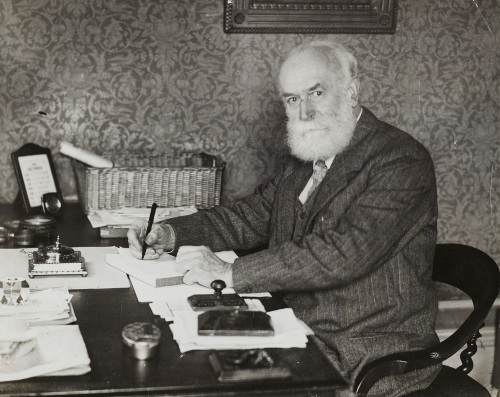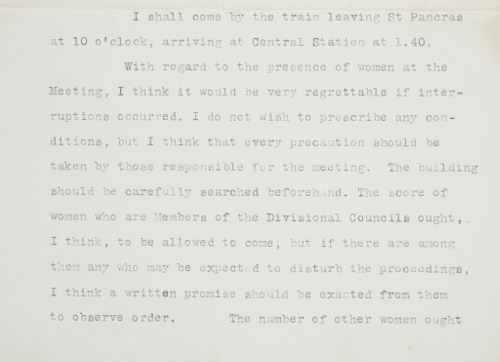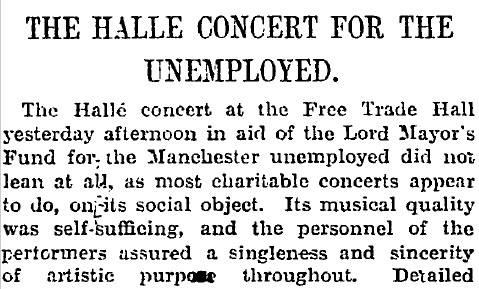Archives Hub feature for April 2017
Explore descriptions relating to liberalism on the Archives Hub.

The Guardian is one Britain’s leading newspapers, with a long standing reputation as a platform for Liberal opinion, and an international online community of 30.4 million readers. Founded in Manchester in 1821, it was created by John Edward Taylor, a cotton manufacturer. In the wake of the Peterloo massacre, the paper was intended as a means of expressing Liberal opinion and advocating political reform. Over the next 100 years, the paper originally known as the Manchester Guardian would be transformed from a small provincial journal into a paper of international relevance and renown.
The Guardian archive consists of two main elements: the records of the newspaper as a business; and a very extensive collection of editorial correspondence and despatches from reporters, and was donated to the University of Manchester John Rylands Library in 1971. From April 2016-March 2017, a project entitled ‘What The Papers Say’ was undertaken to catalogue the editorial correspondence of Charles Prestwich Scott, which contains nearly 13,000 items from over 1,300 correspondents.

Charles Prestwich Scott (1846-1932) presided over the Manchester Guardian for 57 years, cementing the Liberal editorial philosophy of the paper, and ensuring a consistently high standard of journalism and journalistic integrity. He championed causes including women’s suffrage, home rule for Ireland, and the establishment of a Jewish homeland, and stood out against Britain’s policy in South Africa during the Boer war, and conscription during the First World War, supporting the formation of the League of Nations and negotiations for peace in Europe.
C.P. Scott’s editorial correspondence series contains letters exchanged with figures of historical importance and eminence in almost every imaginable field, from politics and economics, to history, science and the arts. These individuals often contributed articles to the paper, and met with the editor to discuss current events and affairs. Examples of correspondents include politicians including Herbert Asquith, David Lloyd George, Ramsay MacDonald and Winston Churchill, and also Marion Phillips, first woman organiser of the Labour party, and Mary Agnes Hamilton, politician and broadcaster.

Campaigners for women’s suffrage are represented in the correspondence by Christabel and Emmeline Pankhurst, and Charlotte Despard, amongst many others.

The Liberal perspective of Scott and the Manchester Guardian can be seen in the interactions between Scott and Roger Casement, Irish nationalist, Rabindranath Tagore, poet and educationist, Emily Hobhouse, social activist and charity worker, Chaim Weizmann, Zionist, and social reformers Eleanor Rathbone and James Joseph Mallon. Scott creates a dialogue with these individuals about their fields of expertise, using the paper to provide a platform for the promotion of their views and causes.
The editors and proprietors of other newspapers are also featured in the correspondence, including William Maxwell Aitken, Lord Beaverbrook of the Daily Express, and James Louis Garvin of The Observer. Their correspondence includes discussion of current events and politics, and also expressions of admiration for Scott and the Manchester Guardian.
Literary figures also feature in the correspondence, such as George Bernard Shaw, John Galsworthy, William Butler Yeats, Harley Granville-Barker and Arthur Ransome. Prior to writing Swallows and Amazons, Ransome acted as a correspondent for the Manchester Guardian in Russia and Estonia, also writing a long running column for the paper on fishing.
In addition to occasional and expert contributors, there is a vast array of correspondence with members of staff of the paper, relating to editorial, technical, business and staffing concerns. These letters provide insight into the operation of a newspaper, alongside an impression of the colossal impact of events such as the First and Second World Wars.
Threaded through Scott’s correspondence, and the Guardian archive, there is also a real sense of the influence of the paper’s location in Manchester, and the significance of the Manchester Guardian in the history of the city. It can be seen in the approach to trade and industry, to the arts, and to education.
The centrality of trade and industry in Manchester meant that these subjects became a focal point of the Manchester Guardian. Such was the Manchester Guardian’s influence, that by 1920, Scott was able to employ the renowned economist John Maynard Keynes to produce a series of supplements for the Manchester Guardian Commercial on proposals for the reconstruction of Europe following the First World War.
Scott believed in the importance of producing a high quality of articles and reviews on the arts, and ensured coverage in the Manchester Guardian for literature, art, theatre and music. This would lead to a close relationship between the paper and Manchester’s resident symphony orchestra, the Hallé Orchestra. Scott would also become a supporter of the Whitworth Art Gallery, the Manchester Art Gallery, and of the production of Ford Madox Brown’s Manchester murals for the city’s town hall.

Scott used the Manchester Guardian to champion the importance of access to education, evident in his work as a trustee of Owens College, which would become the University of Manchester. Scott was also one of the founders of Withington Girls School, established in 1890. This belief in the importance of education for women may be seen as an element of his more general perspective on women’s rights, which would lead to his influential support of the women’s suffrage movement.
For more information on the Guardian archive, and the collections held at the John Rylands Library, please visit:
https://archiveshub.jisc.ac.uk/manchesteruniversity/
http://www.library.manchester.ac.uk/special-collections/
https://rylandscollections.wordpress.com/
Jessica Smith
Archivist
The John Rylands Library
The University of Manchester
Related:
Explore the Editorial Correspondence of C.P. Scott collection (1821-1970s) on the Archives Hub.
Explore the Archive of the Guardian (formerly Manchester Guardian) collection (1821-1970s) on the Archives Hub.
Browse the University of Manchester Special Collections on the Archives Hub.
Guardian News and Media Archive
The GNM Archive mainly holds records that relate to the Guardian since its move from Manchester to London in the 1960s (and some earlier records though the majority are held at the John Rylands Library, The University of Manchester).
Explore the Guardian News and Media Archive collections on the Archives Hub.
All images copyright The John Rylands Library, The University of Manchester and reproduced with the kind permission of the copyright holder.



 The
The